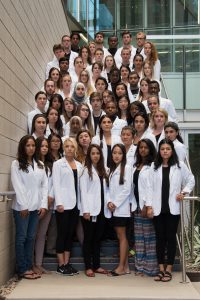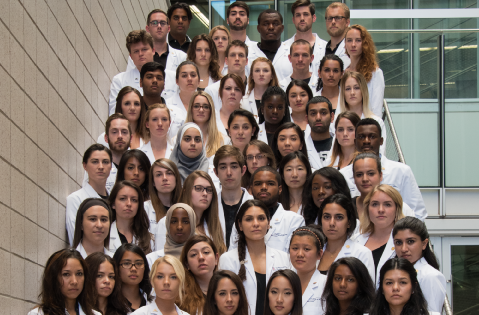I was once told by a classmate, “You know, if I said that white lives matter, I would get into trouble, don’t you think?” At first, I was dumbfounded. We had just come out of a long anatomy session, and the comment hit me by surprise. I didn’t know what to reply at the moment but tried to moderately explain my view as a black student. Deeply, I believe I did a terrible job trying to explain social biases and regret not having a longer conversation about it with my classmate.
To clear the air, white all lives DO matter. You are a human being, someone with a personality, ideals, emotions, friends and family, hopes and dreams. Everyone in this world matters, and absolutely every one of my classmates, regardless of their color, race, gender, sexual preference, or political ideology, matters to me. However, we need to understand the meaning behind “Black Lives Matter.” And that is the one question that many of us have failed to ask any of the 8 black medical students on this campus (MS1, MS2 and MS3), or any other black person: “Why?”
Why do black lives matter?
Our country has a history of prejudice and bias towards groups of people that do not conform to the standard norm of a white, Christian, heterosexual male. Hence, others are categorized as minorities. We have women, gay men and women, Native Americans, Hispanics, and many more suppressed voices constantly fighting for equality. Out of that fight, just as the rainbow flag became a symbol for the LGBTQ rights movement, for example, Black Lives Matter became a cry for our country to understand prejudices against black people.
Racism is still alive. It can be blatantly obvious sometimes. I’ve had several experiences of cars passing by and someone yelling “N***er!” at me. Other times, it is subtle, like assuming someone will get a position, or medical school seat, because of their color and affirmative action and not due to their intelligence and commitment to their dream. Ask any person of color about a time when they were racially discriminated against; we have plenty of stories to share.
Socially, there are data supporting the existence of prejudice against the black populace. For instance, black people are 6 times more likely to be incarcerated than whites, and along with Hispanics, blacks composed 58% of all inmates in 2010. When we look at our overall population in the US, 12.6% is black and 61.6% is white. The higher proportion of black people in jail, even if our population in the country is lower, is disturbing, and the problem runs even deeper. Statistics show that 24.1% of African Americans live under the poverty line; in comparison, 21.4% of Hispanics and only 9.1% of whites do. Educationally, black students at any educational level have greater drop-out rates, smaller enrollment numbers, and a lower graduation rate than their white counterparts. All these factors measure up to produce a social divide. This divide, and certainly more, is what we fight against if we say that black lives matter. Discrimination, biases, violence, unfairness, disparity—these are the problems we struggle with every day.
One wouldn’t get into trouble for saying that white, or all, lives matter. However, it demeans the movement of black citizens seeking equality because it appropriates the call and turns it into something completely different. We live in a white-dominated world. Our society has demonstrated over and over that it would try to silence the voices of people shining light on a problem, especially those of minorities. It is called privilege: a term utilized to demonstrate a lack of understanding of the struggles of a less represented or different group of people, by others who were isolated or simply do not wish to learn. In AmeriCorps, if you want to learn about others, we call it walking in their moccasins. We do not hold a bias, a thought of judgment, or an ill feeling until we come to understand where the other person comes from.
Yet as a medical student, I experienced privilege when there was an uproar after a group of classmates and I decided to demonstrate support for our black community using our white coats. We met with faculty to discuss the problem. We received emails to change our event and cater to what others wanted. Like in society, as people of color, we had to work twice as hard and be twice as tired to get one thing done. Fortunately, the picture happened, and we couldn’t have been happier with the support from our classmates from all four classes. Whether you showed up or couldn’t, thank you. As physicians, we should show support to our communities. Let us walk in each other’s moccasins.
Dario Alvarez is a first-year medical student at The University of Arizona College of Medicine – Phoenix. He is an immigrant from Cuba and Venezuela. In 2014, he completed his BS in biology with a minor in English literature before serving with AmeriCorps as a City Year member. Dario enjoys sports and poetry, and he dreams of running a FQHC as a primary care physician in the future.

